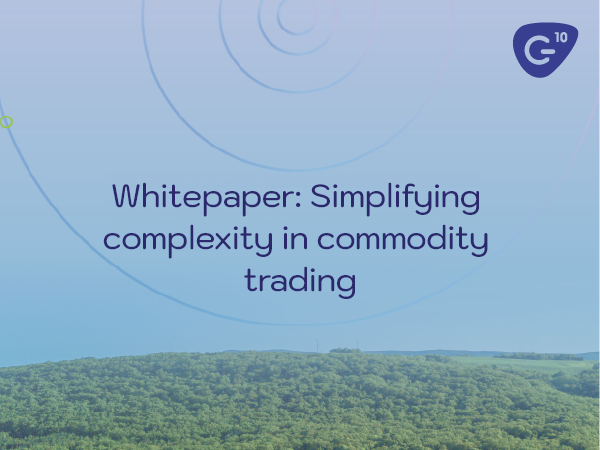Cotton is a particularly complex commodity to trade due to the intricate logistics processes involved. These processes can introduce operational risk, delays, and cause major headaches for operators trying to establish reliable supply chains for their organisations and clients.
There is a great deal of data to manage and communicate with supply chain partners, and to make matters more complex, processes vary by region and crop. For example, some crops may be sold using take-up or pre-takeup files, whilst others rely on gin files. Payment dates and terms also vary based on region, and even when the same reports are used, such as recap reports, in some cases they are used as part of the sale, and others as a shipping document only.
And all this data needs to be managed down to the bale level. Meaning that every single bale has quality information that needs to be uploaded into your management system, updated after inspections, and translated as bales are shipped, warehoused, and packed. This quality data is used in several documents for banks, shipping, and clients, but also needs to be shared internally as it feeds into contract pricing as well.
This complexity does not only mean that cotton logistics can consume many person-hours, it also introduces operational risks into the business if your people are not supported by the right systems to help prevent errors and speed up data flows. And cotton merchants also need to manage the full range of risks associated with any commodity trading; credit risk, counterparty, price fluctuations and market risk, to name but a few.
The good news is that a Commodity Management System can help you incorporate risk management, traceability, and other organisational silos into your cotton management system for more joined-up operations and a more reliable supply chain.
What is a Commodity Management System?
A Commodity Management System combines the risk management features of a traditional CTRM with logistics functionality to bring your entire business together. The best Commodity Management Systems, such as Gen10’s CommOS, incorporate even more processes, such as software supporting commodity traceability to remove organisational silos and enable your business to work as one.
A good CMS should also improve your data flows and operations by automating these time-consuming and manual processes. These automated workflows need to take into account the various processes that differ by crop. They should enable you to automatically create shipping documents, calculate pricing, direct all contracts through the appropriate approval channels with a click, and include a wide range of checks and controls, from credit limit checks, to ensuring allocations are within tolerance and mandatory documents are all completed.
How commodity management creates more reliable cotton supply chains
Your business in one place
A Commodity Management System brings trading, logistics and risk teams together in one place. This provides each team with the live information they need to make the best decisions quickly. So traders and risk managers can identify your most (and least) reliable counterparties, ensure they are working with verified and approved suppliers before creating a contract, and check for pre-approved credit limits.
Integrations with vessel tracking and warehouse systems combine with detailed inventory management capabilities to ensure full position visibility for traders and operators, allowing your team to make the best allocations and the most efficient use of your resources.
Flexibility
When defining and automating processes, it’s essential to build flexibility into the system. As discussed above, a CMS needs the flexibility to support every crop’s unique processes and automate each of them, so that your team can operate at their most efficient and with all the risk safeguards that come with the CMS, whichever crop they are working with. The flexibility prevents any offline processing that can reintroduce operational risk, errors, and delays.
And a flexible system also gives you more flexibility to respond when things do go wrong. From the more routine need to reject defective shipments and incorporate this option into workflows, to being able to identify late shipments and create contingency plans on the fly. The availability of accurate and timely information combines with system flexibility to give your people the tools they need to respond with agility and mitigate issues as they arise, minimising their knock-on effect on your wider operations.
Inventory Management
As mentioned above, it is essential that your cotton CMS provides inventory management right down to the bale if you are to get the full benefits of the system. The CommOS Commodity Management System makes use of “virtual lots” to digitally reflect exactly what is happening in real life. The virtual lots include every bale within the real-world lot and all their quality data. This allows you to manage all physical inventories, from the moment you receive details from the seller. You have full position visibility over inventories in warehouses and at sea, as well as incoming shipments and those still awaiting allocation. Allocations are even simpler with the full quality data and controls to ensure they are within contract tolerance.
And you can automate many of the more time-consuming inventory management tasks, including data uploads and creating recap reports or container packing lists using files received from the warehouse to update all virtual lots with no need to manually update each bale.
These inventory management features mean your operations can be faster and more responsive, and that your team can identify issues as soon as they arise. They can ensure that all stock is allocated effectively and that all contractual obligations are met, for smoother, more reliable supply chains.
Traceability
Traceability is becoming a core part of all commodity supply chains. It is an important element in ensuring supply chain reliability as it helps you identify any problem areas or unreliable suppliers much sooner so that you can act faster. It also enables you to better-serve the growing number of clients who are looking for sustainable cotton if you can manage certificates and provide the precise provenance of each bale in a reliable and verifiable process.
Once again, having the right Commodity Management System can make all the difference. Because all your operations are being carried out within the system, which includes all your bale-level data, it is easy to track any bales back to the original farm or gin, depending on the information you have been provided. CommOS also creates a digital audit trail of every action, which powers risk and management reports, as well as providing a comprehensive record for any traceability assurance.
Conclusion
Cotton merchants face many of the same supply chain challenges as other commodity traders, but also need to deal with a lot of complexity specific to cotton. This complexity can make operations more challenging and introduce risk to the business, ultimately meaning supply chain resilience can be compromised.
However, Commodity Management Systems empower cotton traders to bring their entire business together in one place, creating more efficient operations and therefore more reliable supply chains. From proactively preventing issues arising, to being able to respond with certainty and agility when things do go wrong, a Commodity Management System helps cotton traders build more reliable supply chains that benefit their business, their team, and their clients.
At Gen10, our experience of creating cotton management technology spans over 20 years. Over this time, we have worked with our clients as their supply chains evolved and have developed CommOS with all the functionality and flexibility cotton merchants need to create reliable supply chains, among many other benefits. Get in touch today for more information or a quick chat about how CommOS can solve all of these challenges above, as well as how it can be customised to suit your unique operations.
This article is part of a series exploring CTRM and Commodity Management in cotton trading.
Want to read more?
Subscribe now for monthly updates
By submitting your details you agree that we can store your data and communicate with you. You can opt out of these communications at any time. Read all in our Privacy Policy.



